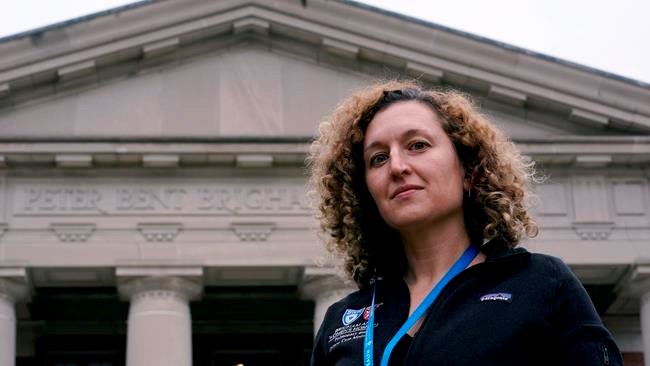LONDON — The coronavirus pandemic has forced television hospital shows to confront a key question — could the biggest medical crisis in recent decades be ignored in
Medical shows have reached different conclusions, but Fox's “The Resident” opted to address the pandemic right away in its fourth season debut Tuesday.
Dr. Daniela Lamas, who works in critical care at Boston's Brigham and Women’s Hospital, also writes “The Resident." She said pretending the pandemic never happened was discussed in the summer, but ultimately dismissed.
“The question was, will people have the stomach for this in January? And the answer to that question was, we don’t know," she said.
“Whether they do or they don’t, we can’t in good faith, as a medical show that claims to have some degree of medical veracity, we can’t ignore the greatest public health crisis of our time. And we can’t expect people to see our characters and believe in them if these fictional health care providers have not experienced what real health care providers have in this fictional world.”
The show, which stars Matt Czuchry, Emily VanCamp and Manish Dayal, takes a thriller perspective on diagnosing medical mysteries and healthcare corruption at Chastain Memorial, a fictional hospital in Atlanta.
Other U.S. medical dramas, "The Good Doctor,” “Chicago Med” and “Grey’s Anatomy," have focused on the pandemic’s impact on healthcare workers this season. On “Grey's,” main character Meredith Grey is in critical care fighting the virus.
“The goal — and presumably it’s one shared by a lot of television shows — which is, what can we show people that they might not know otherwise?” explains Lamas.
"The Resident,” like its contemporaries, includes storylines which highlight the virus’ disproportionate impact on communities of
“There are issues that that come up in terms of money, in terms of resource, in terms of PPE, that that also fit well in the kind of wheelhouse of our show,” said Lamas.
“The Resident” was among the productions that donated to real healthcare workers the masks that would have been used as to be used as props and continues to use lower grade masks on the program to avoid using up supplies.
They also let go of the drama provided by the last-minute corridor dash for surgical intervention, which often provides an episode’s life or death tension.
“People were wondering, can we take somebody for a big surgery? And I mean, sure we could. But does that reflect the real story? COVID is so much about waiting. It’s so much about decisions around intubation. It’s so much about isolation. And so I think really being willing to tell that story, instead of the big surgery, alarms blaring, recovery story was something that that we had to get into as well.”
Unlike “Grey’s Anatomy,” “The Resident” won’t keep the coronavirus front and
“I think ‘Grey’s’ does that through their beach. I think that’s their escapism and I like that,” said Lamas of the dreamlike sequences experienced by Ellen Pompeo's Meredith during her illness.
“There are COVID stories that we could have for a season beyond. But I think that the need, the desire to give people both the grounding in medical reality and then the escapism, the entertainment and, ultimately, the hope that this isn’t forever.”
“COVID is always going to be a presence with us throughout the course of season four but we hope it’s not something that’s going to overwhelm the audience and we can find something that is a balance between the two and something that’s cathartic and joyful and hopeful,” said Matt Czuchry, who plays Dr. Conrad Hawkins on the show.
"Just as simple as not seeing us with masks on the whole time is hopefully something that says, ‘Hey, we can get there. You know, we can get past this; we can get through this.’ But in order to be able to say that, we have to address the reality of the situation, which is incredibly difficult and traumatic for so many, so many people.”
ABC’s “The Good Doctor,” starring Freddie Highmore, had two episodes called “Frontline” where the characters took on COVID-19, before moving into a post-pandemic world.
“The Resident” takes a similar approach.
The season opener flashes back to the personal and political impact of the virus on Chastain Memorial — before placing Hawkins, Nurse Practioner Nic Nevins and Dr. Devon Pravesh into a safer future.
The pandemic's fallout will still affect the characters, but the crisis is over.
It could give real medical staff a glimpse of what their future holds if, like Lamas, they avidly follow hospital shows.
“I’m probably the minority in that I do not miss an episode of medical dramas,” she said. “A lot of the nurses in the medical ICU watch ‘The Resident.’ We chat about ‘Grey’s.’”
“For many people, it is the way they see hospitals, people who have the good fortune not to see hospitals through themselves or their family. And for those of us who work in the hospital, there is something powerful about seeing this sort of escapism type of version of our reality on television.”
Hilary Fox, The Associated Press




